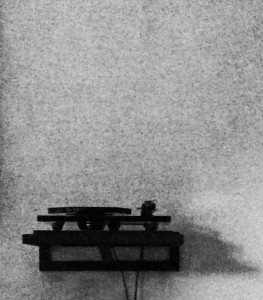
Ein Schatz der jüngeren englischen Filmgeschichte. Leider weitgehend in Vergessenheit geraten. Hier die ersten 8 Minuten einer Doku über Christopher Petit:
Scene From The Other Side
2013 9 Dez.
Radio On: The familiar quickly becomes unfamiliar, the natural unnatural, the real strangely unreal. Kraftwerk’s contributions also present a strange contradiction to the soundtrack: an odd, compelling mixture of the human and the inhuman: nostalgic yet distant: human ghosts lost in the machines. Robert Fripp’s otherworldly ‘Urban Landscape’ plays over shots of a city at night, of sound and light … again, familiar yet somehow intangible. There is a distinct, pensive tone to this waking daydream of a film.
von: Manafonistas Filed under: Blog | TB | Tags: Film | 4 Comments
4 Comments
-
Michael Engelbrecht:
A meditation on the fractured cityscapes and ghostly rural landscapes of late 1970s Britain.
In the autumn of last year, the British Film Institute released a new print of Chris Petit’s ‚anti‘ road-movie ‚Radio On‘ at selected cinemas. I managed to catch it during one of its limited runs and was completely blown away by what I saw.‚Radio On‘ is a subtle, masterfully understated meditation on late 1970s Britain. Its loose, barely-existent narrative is told through a rich monochrome print of ghostly whites and glossy blacks: presenting fractured, dehumanising Ballardian urban backdrops alongside gloomy, ethereal rural landscapes. Resonating panning shots of cityscapes, saturated with the detritus of defunct nineteenth century industry, alongside boarded-up, dilapidated buildings, abandoned petrol stations and empty hotels all contribute to a profound and poignant sense of simultaneous wonder and dread. Beautifully crafted static shots emphasise the empty meaning of modern existence through images of blank, static television screens, monotonous flickering marquees and lurching fuel-pump dials.
The soundtrack that underscores the entire film lends context to the time it was made, but also adds a dreamy, abstracted depth to the cinematography. David Bowie’s ‚Heroes/Helden‘ opens the film as a camera slowly pans around an austere apartment; the familiar English lyrics juxtapose with a German rendering of the song that throws all listeners into strange new territory.
The familiar quickly becomes unfamiliar, the natural unnatural, the real strangely unreal. Kraftwerk’s contributions also present a strange contradiction to the soundtrack: an odd, compelling mixture of the human and the inhuman: nostalgic yet distant: human ghosts lost in the machines. Robert Fripp’s otherworldly ‚Urban Landscape‘ plays over shots of a city at night, of sound and light… again, familiar yet somehow intangible. There is a distinct, pensive tone to this waking daydream of a film.
Artistically, ‚Radio On‘ is a journey through underground arthouse cinema from the 40s to the 70s: an experimentation in European forms of cinematic expression. But ‚Radio On‘ is also a journey in itself: the strangely melancholy story of a protagonist disconnected from his job, his friends, his family and his surrounding environment. Upon hearing of the death of his brother – which may or may not have been a suicide – the leading character begins a journey to Bristol, perhaps to uncover an unknown truth.
Along the way, the protagonist finds himself meeting a diverse collection of characters. There is a soldier, driven to violence and psychosis by a job he despises. A guitar player (played by Sting) who finds himself nostalgic for an idyllic past while looking to the dreamy possibility of a future in music that has been „lost in the post“. There is a German woman who finds herself disconnected from her homeland, her family, her language and her own sense of identity. And then of course there is Robert B., the leading character: an individual of no apparent origin and no apparent destination. He is caught in a static, kaleidoscopic sense of existential angst amplified by the meaningless, alienating routines of modern life.
‚Radio On‘ is ultimately a film about a time and a place. There is a sharp, distinct yet inexplainable mood that saturates every note of every song, and every grain of every shot. The tone of ‚Radio On‘ expresses a time and a place where everything rests on the cusp of inevitable change. The central irony of the film being the final victory of universal cynicism, as Britain spirals into political turmoil and the unforgiving, authoritarian political agendas of Thatcherism take a firm grip.
There is no final sense of resolution as the film draws to a close. ‚Radio On‘ is an experience to be absorbed rather than a story to be followed: the circumstances that surround Robert’s brother are never really made clear. Instead, ‚Radio On‘ dwells on its own thoughtful ambiguities, opening the possibilities not only for the self-discovery of its protagonist, but for the self-discovery of its audience.
‚Radio On‘ is not a film that espouses truth, or that claims to grant a closure or sense of direction to the lives of its audience. Instead, it is a film that centres itself around such problems: tackling them head-on. ‚Radio On‘ is a film that confronts the absurdity and disenchantment of 20th Century living and questions the very nature of our lives. It is a reflection on existence: a meditation on a time and a place that not only reflects the period of its inception, but still holds a strong resonance with audiences today. A beautiful, gloomy, melancholy masterpiece, and an absolute must-see.
– written by rhys tranter -
Jochen Siemer:
Sowohl Film als auch Text sind sehr interessant.
-
Jochen Siemer:
Brilliantes Photo! Titelvorschlag: „Im Planarsaal“
-
Ian M:
The BBC showed this film a couple of weeks ago. The screenplay never really gets into fifth gear (or even fourth or third) but it doesn’t matter. The photography is wonderful.
As is the Kraftwerk/ Cochran juxtaposition – end of the 50s/ end of the 70s. Ends of eras.